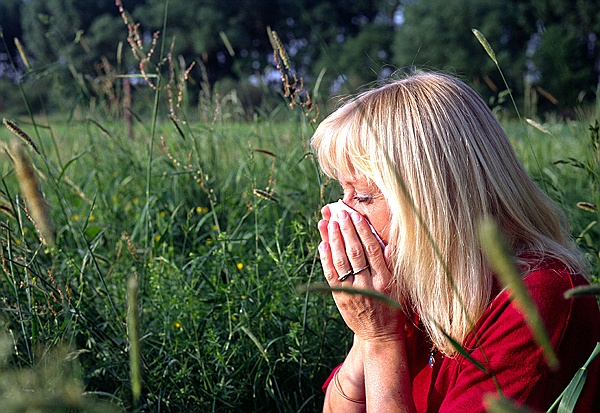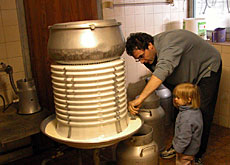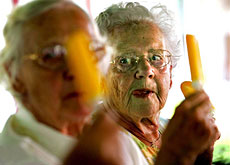Why spring can be miserable for some

Spring flowers and blossom can be beautiful, but for the more than one million people in Switzerland who have a pollen allergy, they can spell trouble.
Saturday is National Allergy Day and experts have clubbed together to raise awareness of pollen allergies, which, left untreated, can sometimes cause asthma.
The symptoms are familiar: running nose, itchy eyes, sneezing and wheezing. Having a pollen allergy – the most common allergy in Switzerland – can mean a miserable spring and summer. In addition, 15-25 per cent of sufferers have an associated food allergy.
Georg Schäppi, director of aha! – the Swiss Centre for Allergies, Skin and Asthma, which is involved in the Allergy Day, said that people should take the problem seriously.
“If people don’t do anything or the wrong thing, they can make their situation worse and the symptoms can become worse,” he told swissinfo.ch.
“It can start with problems in the nose and then can develop into lung problems such as asthma.”
On Saturday Aha! and the Swiss Society for Allergology and Immunology (SSAI) are setting up stands in five cities across Switzerland to hand out information and carry out basic allergy tests on the public.
On the rise
An estimated 20 of Switzerland’s 3,500 plants cause allergies. Around 70 per cent of sufferers are affected by grass pollen but in the past years reactions to birch pollen have also increased.
Overall, pollen allergies have been rising, Schäppi said. In the 1920s-1930s, around one per cent of the population had a pollen allergy, compared with around 15 per cent today. Its incidence has now largely stabilised, albeit at a high level.
There are several theories as to why there has been a change. “Air pollution may play a role because pollen carries more allergens in areas with more air pollution. People might also react more in these areas because their lungs are already stressed,” said Schäppi.
Peter Schmid, head of the allergy unit at Zurich University Hospital, said that genetics can play a role, as can modern day hygiene.
“We live in a cleaner environment and have fewer infections,” he explained. “We know that some kinds of microbes can help prevent allergies, so children on a farm have fewer allergies than those in the city.”
Schmid, whose unit sees around 15,000 patients a year, said that prevention measures, such as washing hair in the evening, formed the first part of pollen allergy treatment. Drugs can also be used to calm the symptoms.
Immunotherapy
Patients can also opt for an allergen specific immunotherapy, commonly known as the allergy vaccination.
“Through immunotherapy we try to modify the immune system which reacts too strongly to pollen so that it behaves normally. To do this, nowadays we still need several months or years and repeated injections or daily drops,” Schmid told swissinfo.ch.
A successful immunotherapy can cure the allergy, at least for ten to 15 years. But it may not always be necessary. Allergies can improve on their own as a person ages, as the immune system becomes calmer over time, Schmid added.
In addition to medical measures, sufferers can also use the pollen forecast drawn up MeteoSwiss, the national weather forecast service, to see how much pollen is in the air and where the concentrations are the highest. The information is posted on a special website www.pollenundallergie.ch.
“This information is important for taking preventative measures such as taking medications or going to regions were pollen concentrations are not so high like the Alps,” said Regula Gehrig, head of the Swiss Pollen Network at MeteoSwiss.
Pollen forecasts
The network of 14 pollen traps across the country has benefited from the recent addition of COSMO-ART, a numeric weather model which can show where pollen is being released and how it is being transported in the air across Switzerland. It is currently being tested for birch pollen.
The goal is to have information for the whole of Switzerland and not just at the traps.
The cold winter meant that the start of the pollen season was very late this year. “It normally starts at the end of January with hazel and alder, but this year it started around February 20,” Gehrig told swissinfo.ch.
“The rest of the season will be a little bit later. Birch normally starts to flower at the end of March, this year we expect it from April 5-12.”
And the rest of the year? “Depending on the severity of the pollen season, it’s very hard to make a forecast, but we expect a kind of medium birch pollen season this year,” said Gehrig.
Isobel Leybold-Johnson, swissinfo.ch
January: (hazel and alder pollen)
February: hazel and alder pollen
March: ash and birch
April: birch and ash
May: birch and grass
June: grass
July: grass and mugwort (ambrosia/ragweed)
August: mugwort (and grass, ambrosia)
(Source: The Swiss Centre for Allergies, Skin and Asthma)
National Allergy Day on March 20 is taking place in Zurich, Basel, St Gallen, Yverdon-les-Bains and Sant’Antonino near Bellinzona.
Experts, including Peter Schmid, will be on hand to dispense information, advice and do allergy tests, it was revealed at a joint aha! and MeteoSwiss media conference on Tuesday.
Around 15 per cent of the population suffer from a pollen allergy, with the most affected age group being 15-25 years old. Children as young as five or six can also be affected and experts advise that youngsters with symptoms be properly tested.
It is also possible for someone who has never had a pollen allergy to develop one at age 60 or 70.

In compliance with the JTI standards
More: SWI swissinfo.ch certified by the Journalism Trust Initiative













You can find an overview of ongoing debates with our journalists here . Please join us!
If you want to start a conversation about a topic raised in this article or want to report factual errors, email us at english@swissinfo.ch.